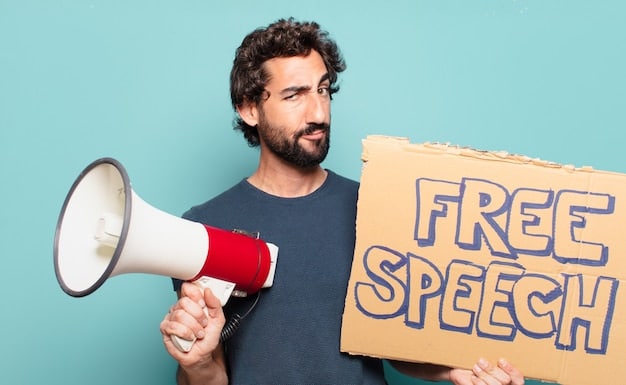Social Media Censorship: Is It a Threat to Free Speech?

The debate around social media censorship revolves around whether platforms’ content moderation practices infringe upon the principle of free speech, a fundamental right often associated with democratic societies.
The rise of social media has created unprecedented opportunities for expression, but also sparked intense debate over content moderation. Is social media censorship a threat to free speech? A heated debate continues to rage, with voices on both sides raising critical questions about the balance between platform responsibility and individual rights.
The Evolution of Free Speech in the Digital Age
Free speech, a cornerstone of democratic societies, has a long and storied history. As we navigate the digital age, its traditional boundaries are being tested and redefined. The rise of social media platforms as primary spaces for public debate adds a new layer of complexity to this ongoing discussion.
Historical Context of Free Speech
The concept of free speech has evolved over centuries, originating from philosophical ideals and legal protections designed to safeguard individual expression. From the Enlightenment era to landmark court cases, the right to voice one’s opinions without undue government interference has been fiercely defended. But how do these principles translate to the privately-owned digital spaces where much of our public discourse now takes place?
Social Media’s Impact on Public Discourse
Social media platforms have undeniably transformed the landscape of public discourse. They have democratized access to information and provided marginalized voices with a platform to be heard. However, they have also become breeding grounds for misinformation, hate speech, and other harmful content, raising critical questions about the responsibilities of these platforms in moderating user-generated content.
Here are some key points to consider:
- The internet has facilitated the quick dissemination of information, but also made it more difficult to determine the validity of information.
- Social media has allowed people to connect in ways never before possible, but it has also created echo chambers and polarization.
- Social media platforms have become primary sources of news and information for many, but they are also susceptible to manipulation and disinformation campaigns.
As social media becomes increasingly intertwined with our daily lives, the debate over its role in censoring or promoting free speech intensifies. Understanding the historical context of free speech and the transformative impact of social media is essential to navigating this complex issue.
Understanding Social Media Censorship
Social media censorship is a complex topic with varying definitions and implications. Understanding what it entails and how it occurs is crucial for assessing its impact on free speech. It’s not simply about removing content, but encompasses a range of actions that can limit the reach and impact of certain voices.
Defining Censorship in the Context of Social Media
When we talk about censorship, what exactly do we mean in the context of social media? While traditional censorship typically involves government suppression of expression, the dynamics are different when private companies control the platforms. Social media censorship refers to the content moderation practices employed by these platforms, which can range from labeling content as misleading to outright removing accounts.
Examples of Content Moderation Practices
Social media platforms employ a variety of content moderation practices to address harmful or inappropriate content. These practices include:
- Removing posts: Deleting content that violates platform terms of service, such as hate speech or incitement to violence.
- Labeling content: Adding warnings or disclaimers to posts that may contain misinformation or disputed claims.
- Shadow banning: Reducing the visibility of a user’s content without notifying them directly.
- Account suspension or ban: Temporarily or permanently removing a user’s access to the platform.

While proponents argue that these measures are necessary to protect users from harm, critics contend that they can stifle legitimate expression and disproportionately target certain viewpoints. The line between content moderation and censorship often becomes blurred, leading to intense debate.
The Argument for Content Moderation: Protecting Users
Proponents of content moderation argue that it is necessary to protect users from harm, maintain a safe online environment, and prevent the spread of misinformation. This view emphasizes the social responsibility of platforms to curate content and address issues that can have significant real-world consequences.
Combating Hate Speech and Misinformation
One of the primary arguments for content moderation is the need to combat hate speech and misinformation. Proponents argue that platforms have a responsibility to prevent the spread of content that incites violence, promotes discrimination, or disseminates false information. Failing to do so, they contend, can have harmful consequences for individuals and society as a whole.
Maintaining a Safe Online Environment
Another key argument is that content moderation is essential for maintaining a safe online environment. By removing or labeling harmful content, platforms can create a space where users feel comfortable engaging and expressing themselves without fear of harassment, abuse, or manipulation. This is particularly important for vulnerable groups, such as children and minorities, who may be disproportionately targeted by online abuse.
Advocates believe platform should have a say in what is and isn’t allowed on their social media. It’s essentially their house, so they can decide who is allowed, and what they are allowed to say.
These points highlight the arguments in favor of content moderation, emphasizing the need to protect users, combat harmful content, and maintain a safe online environment.
The Case Against Censorship: Freedom of Expression at Risk
Critics of social media censorship argue that it poses a significant threat to freedom of expression. They contend that platforms’ content moderation practices can be arbitrary, biased, and disproportionately target certain viewpoints. In this view, overzealous censorship can stifle legitimate discourse and create an environment where dissenting voices are silenced.
The Risk of Bias and Overreach
One of the main concerns is the risk of bias and overreach in content moderation. Some critics argue that platforms’ algorithms and human moderators are often influenced by their own political or ideological biases, leading to the unfair suppression of certain viewpoints. This can be particularly problematic when platforms are perceived to be taking sides in political debates, effectively censoring voices that challenge the prevailing narrative.
The Slippery Slope Argument
Critics also raise the “slippery slope” argument, warning that even well-intentioned content moderation can lead to increasingly restrictive censorship. They argue that once platforms start down the path of censoring certain types of content, it becomes easier and easier to justify further restrictions, ultimately leading to a situation where freedom of expression is severely curtailed.
Here are some of the dangers of censorship:
- Limited Discussion: People aren’t allowed to form their own opinions if they only see one side.
- One-Sided Arguments: Not being able to discuss all sides of the conversation may limit people’s views.
- Lack of Trust: When censorship increases, trust decreases since users never know if all facts are being presented.

These arguments emphasize the potential dangers of social media censorship, warning that it can stifle legitimate discourse, create an environment of self-censorship, and undermine the principles of free expression.
Finding the Balance: Transparency and Accountability
Given the complexities of this issue, finding the right balance between content moderation and freedom of expression is crucial. This requires a commitment to transparency, accountability, and due process on the part of social media platforms. Without these safeguards, there is a risk that censorship will become arbitrary, biased, and detrimental to the principles of free speech.
The Need for Clear and Consistent Policies
One key element of finding the right balance is the need for clear and consistent content moderation policies. Platforms should clearly articulate what types of content are prohibited, what criteria are used to make moderation decisions, and what recourse users have if they believe their content has been unfairly censored. These policies should be applied consistently across all users, regardless of their political or ideological viewpoints.
Independent Oversight and Review Mechanisms
Another important safeguard is the establishment of independent oversight and review mechanisms. These mechanisms can provide an avenue for users to appeal content moderation decisions and ensure that platforms are held accountable for their actions. Independent oversight can also help to identify and address potential biases in content moderation policies and practices.
What are some things that social media websites can do to increase fairness?
- Give more warning: Allow users to at least have an idea that they are close to violating guidelines.
- Explain specific rules: Most of the time, it can be confusing what users did, since it can be vague.
- Be more transparent: Provide a way for users to know why they were penalized.
By promoting transparency, accountability, and due process, we can help ensure that social media platforms strike the right balance between content moderation and freedom of expression.
The Future of Free Speech on Social Media
The debate over social media censorship is likely to continue evolving as technology advances and platforms grapple with the challenges of moderating user-generated content. New approaches and solutions will be needed to ensure that the principles of free speech are upheld in the digital age. It’s a constant negotiation between protecting users and allowing people to talk and spread information freely.
Decentralized Social Media and Blockchain Technology
One potential solution is the development of decentralized social media platforms based on blockchain technology. These platforms would distribute control over content moderation among users, rather than relying on centralized authorities. This approach could potentially reduce the risk of bias and overreach, while still allowing for effective moderation of harmful content.
The Role of Education and Media Literacy
Another important factor is the role of education and media literacy in promoting responsible online behavior. By teaching users how to critically evaluate information, identify misinformation, and engage in constructive dialogue, we can create a more informed and resilient online environment. The more people who understand how the internet and social media world operates, the less likely they are to share unvalidated information.
The arguments on either side often have valid points, so they key is how to incorporate both for a better internet experience.
| Key Point | Brief Description |
|---|---|
| 🛡️ Content Moderation | Protecting users from harm and misinformation. |
| 🗣️ Free Speech | Platforms’ content moderation practices are seen as biased. |
| ⚖️ Transparency | Platforms should be transparent with policies for fairness. |
| 💡 Future | Decentralized social media may be part of the solution for free speech. |
FAQ
▼
Social media censorship refers to the content moderation practices used by platforms to regulate user-generated content. This can take many forms, from removing posts to labeling content to banning accounts.
▼
Social media platforms censor content for a variety of reasons, including protecting users from harm, preventing the spread of misinformation, and complying with legal regulations. Platforms also want to maintain an environment which is as positive as possible.
▼
Critics of social media censorship argue that it can stifle legitimate discourse, create an environment of self-censorship, and undermine the principles of free expression. It may also reduce the amount of trust in the website overall.
▼
Finding the right balance requires a commitment to transparency, accountability, and due process, as well as clear and consistent content moderation policies. By clearly defining the rules, you increase trust and allow for more organic conversation.
▼
The future of free speech on social media will likely involve a combination of technological solutions, policy changes, and educational initiatives. Blockchain technology and decentralized websites will affect websites going forward.
Conclusion
The debate over social media censorship and its impact on free speech is a complex and multifaceted issue. Balancing the need to protect users from harm with the importance of upholding freedom of expression requires careful consideration, transparency, and a commitment to due process.






